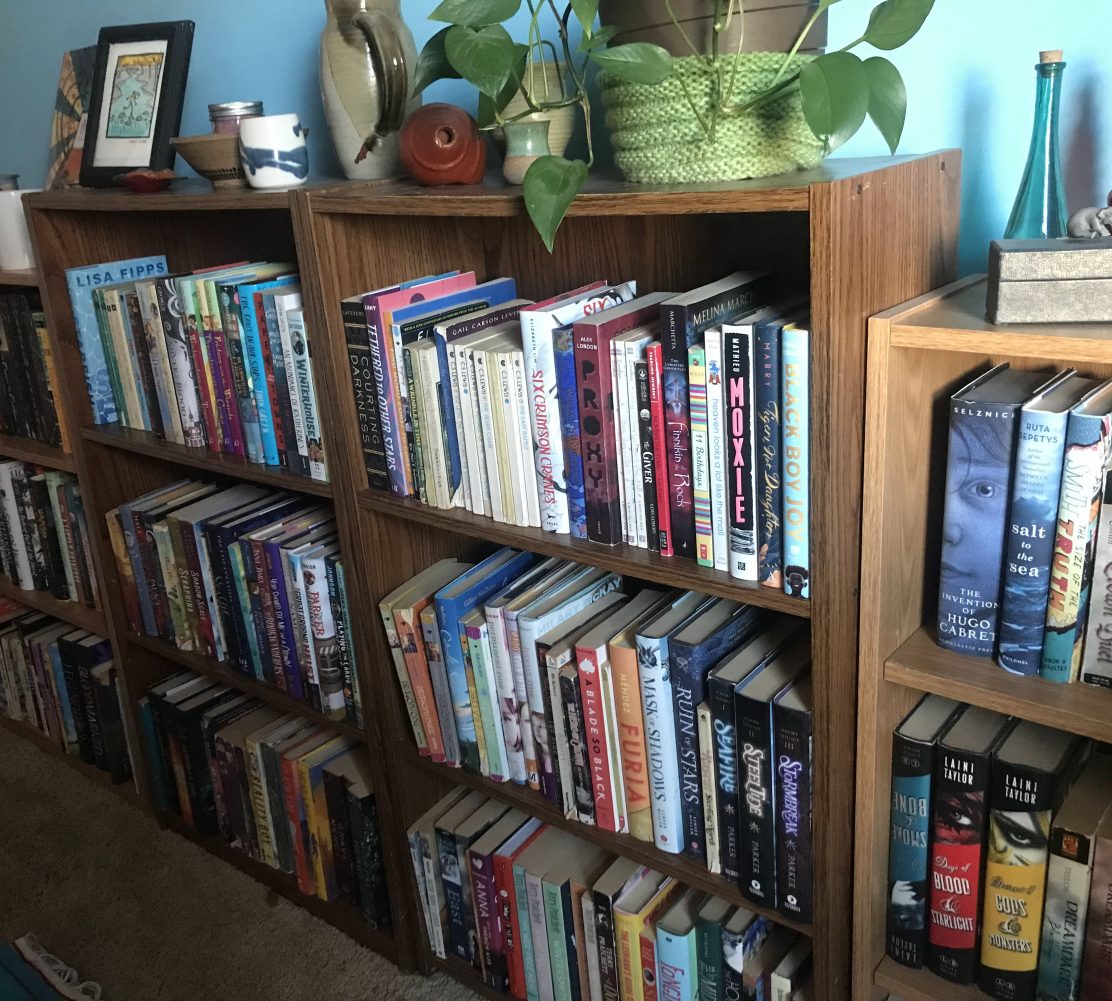 by Michael P. Spradlin
by Michael P. Spradlin
ages: 10+
First sentence: “The room was full of bright light with a glare so intense that I closed my eyes.”
Support your local independent bookstore: buy it there!
Review copy sent to me (ages ago) by the publisher.
Dear authors of a series:
I enjoy a series as much as the next person. Really I do. There are characters I love that I want to spend more time with. And if you’d like to keep writing books about these characters, I won’t mind.
But, honestly: as much as I love these characters, and as fun and interesting and gripping your story is, I do have a problem. See, even if Tristan and Robard and Maryam (I didn’t get it until this book: it’s Robin and Marian!) are bouncing around France in the 12th century (was it called France in the 12th century?) I’d like the book to actually end by the ending. I was enjoying the book — sure it was a bit heavy-handed, but I figured, hey, it’s campy Robin Hood, I can handle that — and then, wham, the three words I hate most: TO BE CONTINUED.
Seriously?
Seriously? It’s an intense climax, a showdown at noon, a holdup, and you give us TO BE CONTINUED?
My first reaction is that you totally want to sell the next book. That you’re not confident enough with the story to give us an ending, trusting that we’ll want to visit with the characters in the next book. There is no call for TO BE CONTINUED in a series. It’s a cop out. A wimpy strategy. It is possible to give us an ending for the book, and still have us wanting to come back for more.
And honestly, I prefer it that way.
Thanks.
Melissa

Oh, thank you. I hope every series author reads your post. I like series books to, but they each must have an ENDING of their own!!!
LikeLike
This sounds like an interesting book/series.
But I do agree with you and Annette about each book in a series needing its own ending….mostly.
I say “mostly” because there are some situations where a “too be continued” or cliffhangers or dangling threads or whatever you want to call them….are viable endings.
In many/most cases, I prefer a self-contained story. However, if it means the difference between getting out the next edition or having to wait another year…or the difference between a single 1000 page book and 3 books of 300-400 pages….I'm fine with the serialization.
That said, there still needs to be some sort of progress made and some sort of conclusion in the story arc. Something to give readers a sense of closure for the pages they just read.
Another good bit of advice for authors is that they make sure you have a number of good, solid stand-alone books out there first to prove their prowess before just ending prematurely and expecting readers to come back.
I'm much more likely to return to a second book after a cliffhanger if I've had previous run-ins with the world/characters and know that the author can tie together a wonderfully intricate story.
If I'm just given a single book in a brand new world/environment and that book doesn't give me adequate closure, I may not even bother with book 2. Even worse…if book 2 ends with another “to be continued” and I haven't received any sense of fulfillment, there's no chance of me going to book 3.
*****
A recent case in point would be the radically popular Hunger Games series.
With Book 1, we had a fairly standard story arc with prep, build up, climax, resolution/denouement. However, it was very evident from the building tension at the end of the book that something dramatic was bound to happen after finishing out Book 1.
So, Book 1 technically “finished” but had a definite sense of “there's more to come.” Not fully a cliffhanger, but enough to leave us wanting more while still giving general closure to the story we just read.
Thus, when Book 2 came out, the readers clamored for it and dove in with vigor. At the end of Book 2, we're given a definite 'to be continued' but we've already learned from the previous novel that the author has a good sense of what she's doing with these characters and thus we trust her enough to eagerly await Book 3 and dive voraciously into it.
Similarly, the Harry Potter and Percy Jackson (and many other similar “series” recently) are filled with book after book of self-contained stories while also following a larger meta-story that slowly establishes itself over the series and eventually comes to a head in the final book. In such a case, each individual book has a solid ending while there is a “to be continued” on the overall story.
*****
So, generally, I feel like a book can/should have a self contained story that actually ends.
It's perfectly acceptable (and expected) for a story to end and still have a number of loose threads and outstanding tension that will provide potential ground for future stories.
It's also perfectly acceptable (at least as far as I'm concerned) to have a “to be continued” ending to a book as long as the author does so in a well-established world or with well established characters. As the author proves his/her ability, we as readers are more willing to trust that future novels will wrap things up for us.
Otherwise, the reader has to question “why did the book end so abruptly?” “Did the author just not know where to take the story?” “If the author actually does have the story planned out, how much longer will it take to reach a conclusion?” “Can I trust the author to reach an adequate conclusion?” “Why does it take more books/pages to get there rather than just tightening things up now?”
LikeLike